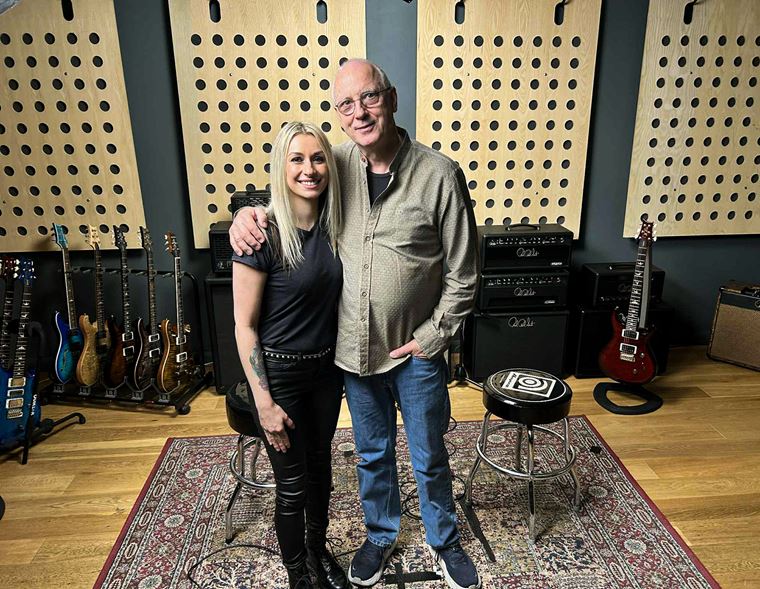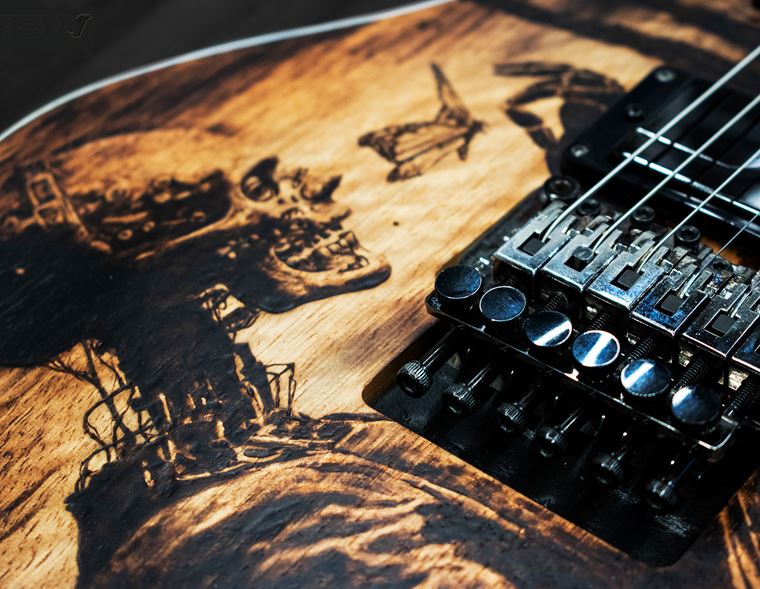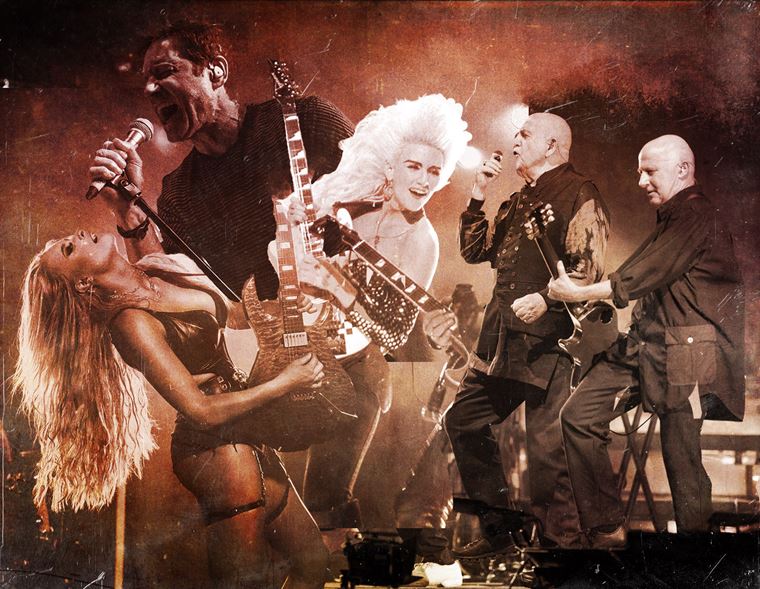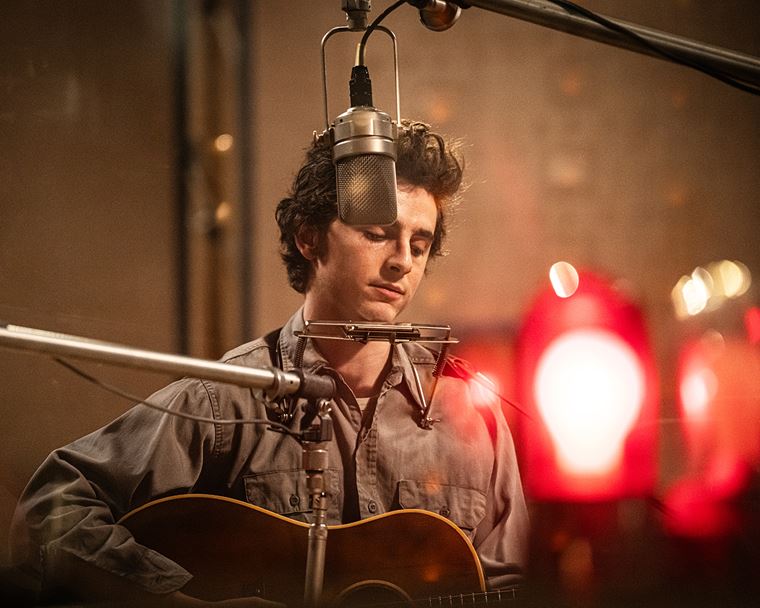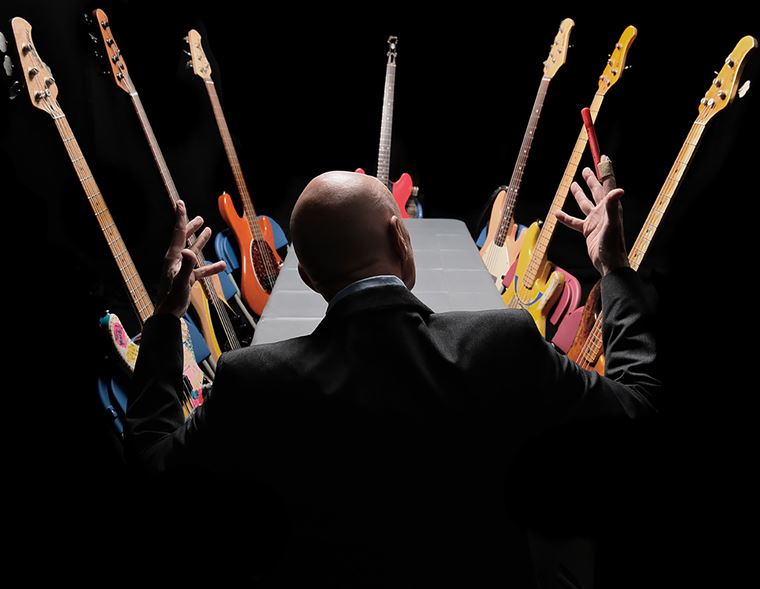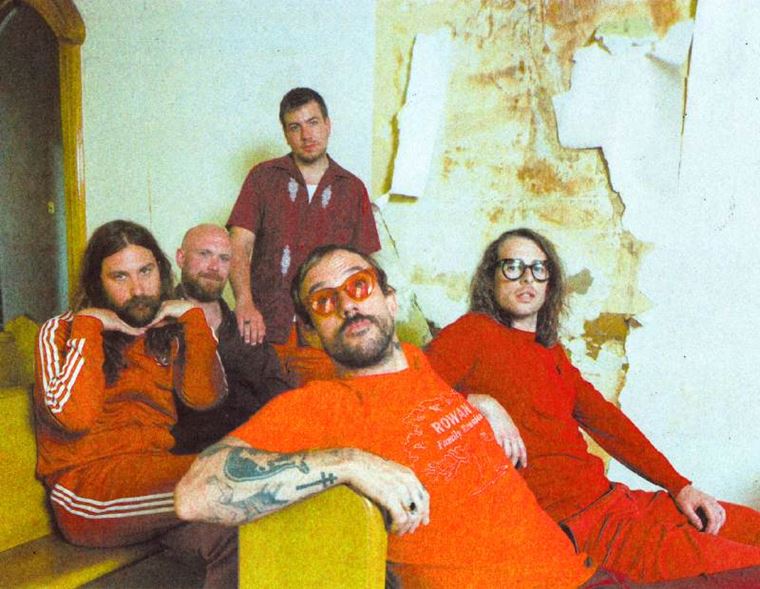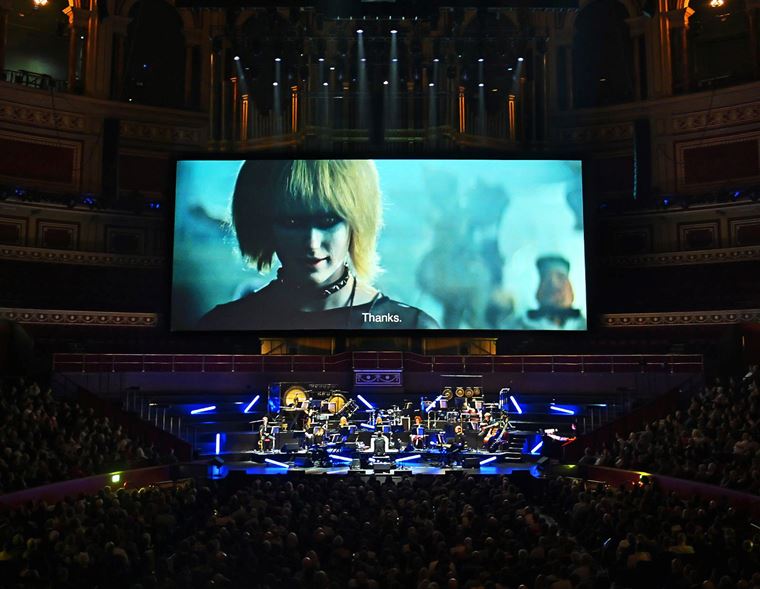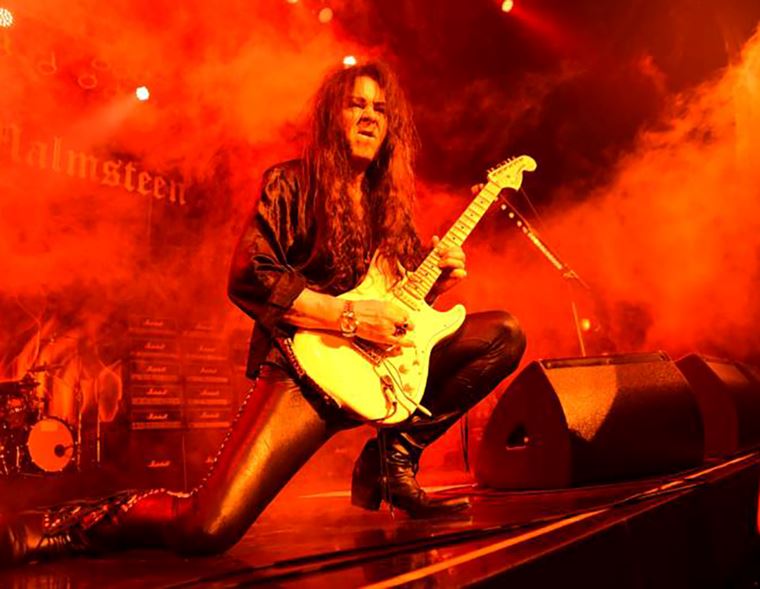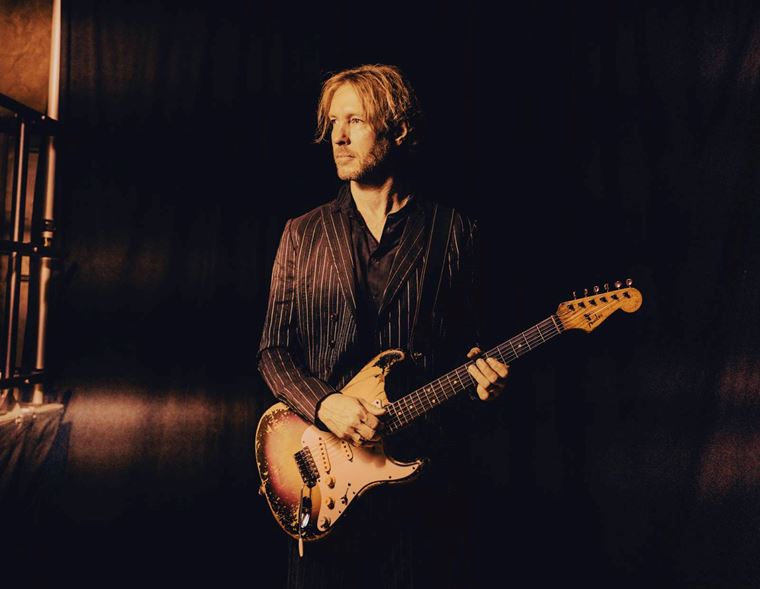STEVE VAI: The Inviolate Interview! Wisdom, Insight and Stories from a True Guitar Master
Can you believe it’s been 6 years since we’ve had a studio album from Steve Vai? The legendary electric guitar maestro has an unrivalled body of work for sure, but if there’s one thing his fans want, it’s more! Modern Primitive was released in 2016, and whilst he’s hardly been conspicuous by his absence – Vai is very active on social media with a huge number of videos on Youtube for one thing – it was definitely a ‘moment’ when the announcement came in December of last year that a brand new Steve Vai album was due for release the following month.

(Photo: Larry DiMarzio)
Well, that time is almost upon us! Inviolate, Steve’s wild and daring new record, is released on 28th January, and we just had to know more! The new record is filled with some of Steve’s most adventurous, most uncompromising playing, bringing to the fore all of the nuance and personality that’s become his trademark. It’s a colourful kaleidoscope of exotic visions, with songs titles like Apollo in Color and Zeus in Chains already painting an evocative sea of pictures in the listener’s mind. Singles have been released already, as you’ll have seen, including Knappsack, a song written and played one-handed since Steve was recovering from shoulder surgery, and Little Pretty, on which Steve uses a hollowbody jazz guitar. These are not the only unusual circumstances that occur on Inviolate, as you’ll learn in our exclusive interview below.
We spoke to Steve not long before Christmas, and found him in as relaxed and jocular a form as ever. It’s always a real occasion to share a conversation with him: he likes to have a laugh and is both self-aware and worldly wise, without taking himself too seriously. Like last time we spoke (click through to our previous Steve Vai interview if you missed it), Steve imparts all kinds of useful and intriguing insights into the more psychological side of being a musician, and is generous in sharing knowledge accumulated in over 4 decades of being one of the world’s greatest musicians. We have a fun conversation for sure, but there’s a lot of great stuff to take away from this, too.
We’ll also learn more about the already-famous Hydra guitar, the stories behind some of those song titles, and a whole lot more besides. Join us now at the point right after we’ve said out helloes and traversed the slightly iffy video signal that connects Steve in California to us in the UK...
Steve Vai Interview
guitarguitar: So Steve, I’ve had a good listen to Inviolate, it’s a stunning album! Congratulations, it’s brilliant!
Steve Vai: Oh, thank you!
GG: I got sent over some of the promo literature, and it says that Inviolate isn’t a full-on concept record the way some of your other albums have been, but some of the titles here...you’ve got Zeus, Apollo, and the Hydra in there! I’m getting heavy Greek Mythology vibes here!
SV: Yeah, it’s odd how that turned out! That was accidental, it wasn’t really intentional. Then it became intentional! It’s interesting because I had written and recorded Zeus in Chains and I didn’t have a title for it. A lotta times, I let the song tell what the title is, just by listening to it. So, I was listening and going, ‘what does this sound like?’, and then that middle section came in where it goes (hums the huge, low-end guitar riff) and there’s this extraordinarily dissonant note just floating on top of it, and the song said: ‘this is called Zeus in Chains’. (laughs) That’s how I named it!
And Apollo in Color, that was the name of my wife’s horse. I just always thought it was a great title for a song. That title basically helped me write the song, so it was a reverse kind of a situation where at one time you let the song tell you what it’s called, and at another time, the title can dictate what the song is gonna sound like.
GG: Cool! And of course, of those mythological beings, the Hydra is of course that quite incredible instrument you’ve recently acquired! We need to talk about that, it’s really something else! How did that come about?
MichaelMesker.jpg)
(Photo: Michael Mesker)
SV: Yeah! Well, the title came to me because the Hydra is a mythical dragon-like creature with multiple heads, you know, where you cut off one of the heads, another one grows. I just thought, ‘Yeah ok, that’s what this guitar should be called!’ But the original idea kinda started about five years ago. I was watching a Mad Max movie and there was this one scene where they’re flying through the desert and there’s this guy strapped to the front of a truck. He’s got a guitar on and he’s playing it, you know this guy I’m talking about? (laughs)
GG: He’s the best guy in the whole film!
SV: I saw this guy and I was like, ‘Man, that is cool, but it’s fake. I gotta do something like that that’s real’! That’s when the idea came to create a guitar with multiple necks and harp strings, and to be able to write a song on it. It all came at one time: to have an absolutely outrageous guitar, but write a piece of music on it that sounds like a piece of music, but is completely performed just on that guitar, you know? No overdubs, no looping, nothing. The challenge was to write a piece of music where I basically juggle all of these strings.
"Wherever you're at as a player - whether you're accomplished or not - it's always good to push your boundaries. It's fun! The feeling of accomplishment is the feeling of fulfillment."
Originally, I had the idea to have a guitar with three necks. It would be a 12-string neck that’s half fretless, a 7 string neck, a ¾ size bass neck that has two of the strings fretless, and harp strings, thirteen harp strings. I was also into steampunk fashion at the time, so I gathered a bunch of materials and my idea and I sent them to Ibanez. These guys got so excited, man, they just hit the wall! They went for it. They sent me a rendering at first, and I looked at this rendering and said, ‘Are you guys actually gonna build that?’ They were like, ‘Yes we are!’ (laughs) It took about three and a half years of going back and forth but when the Hydra arrived at my house and I opened the case, I was just stunned! It was awesome but also intimidating. I knew I had to write a song on this thing, you know?
The designers at Ibanez just went beyond what I was expecting. They brought a whole synthesizer guitar section into the instrument, they put piezos, sample + holds, sustainers...it’s really quite a technical marvel. The brain for it...I haven’t weighed it, but it would take you, me and somebody else to pick it up, you know? (laughs)
So, I received this guitar, propped it up in the studio, and walked past it for about a year and a half, and every time I walked past it, I would have a full-on anxiety attack, haha! I knew I had to get behind this thing and figure out a song! So, I carved out six weeks, sat behind the Hydra and the first thing I thought was: ‘What have I done? What did I get myself into here? I don’t have this kind of independence in my limbs, how am I gonna make a melody that’s completely seamless when I only have one hand to navigate all these other strings?!’
So there was like this intense concern for about ten seconds and then another voice came in, which usually comes in in situations like this: it’s the voice of my confident self, we’ve all got it. And that voice said, ‘Shut the fuck up and just do it, Vai! You know you’ve got this! You know you’ve got it if you put the time in: just shut up and do it! Just start!’ And you know, I’m like, ‘Yes, sir!’, and slowly started to write the song. What’s interesting is, a lot of times, things that seem impossible don’t seem impossible once you just start. You just start. So, that’s what I did.
"I get asked that question about my discipline, and I have to tell you that I have none."
When you listen to the song The Teeth of the Hydra, it’s interesting to point out that all of the bass that you hear, all the 7 string, all the 12 string, all the harp strings, are all performed in one performance on that guitar, so it’s very linear. I did it in sections, though: I sat and got the intro, then I went to the verse and just worked until it sounded elegant and seamless. It couldn’t sound like a disjointed piece of music, because then it would be a gimmick. No, I wanted to honour the guitar’s -and my own – potential. And I believe I did.
GG: Oh yeah, you certainly did! That’s really interesting Steve, because I understood that the music was created on the Hydra but I didn’t realise that you played it as a single performance! I thought you’d have multitracked it all one piece at a time. I was going to ask you how much you can ‘do’ at once on the Hydra, and the answer then must be ‘everything’! Haha!
SV: All of them, yeah. What I did do after I recorded it was, the harp strings ring sympathetically, which means they pick up everything. So, I wasn’t happy with that, so that was one where I went back and I actually overdubbed the harp glisses. You can hear both of them, actually, because I mixed the original harp glisses that were in the performance underneath it, but there’s just a lot of noise, so I laid another track of the glisses.
GG: Okay, yeah, I get that. That whole linear performance aspect leads me onto the next thing I wanted to explore with you. Your song Knappsack, which you played with one hand, and Teeth of the Hydra: as a listener, you’d be entirely unaware of any of the circumstances of your performance. I wouldn’t know that Knappsack was played by a guy with only one hand available to him!
SV: For me, the most important thing that I shoot for in a piece of music is the melody. With something like Knappsack, with the idea to record the song with one hand, that was an easy idea, it was out of necessity. And I knew I could do it. You know, that kind of legato, hammering guitar playing with one hand, well it’s not that much of a mystery. But the melody had to be uniquely ‘Vai’, and that’s why I make music: I love writing melody. When I went to record Knappsack, I wrote out the melody and the chord changes for the verse, so I felt like I had something. I knew if I captured the melody, the rest of the song is gravy. I can go mad! And one of the things that I wanted to achieve with that song was the sense of relentlessness, because it doesn’t let up! I love that, you know? There’s an energy in relentlessness, and I did it the best I could. You know, when you’re on a stage with Zakk Wylde, that’s relentless, ok? (laughs) That guy has so much staying power, I can’t even fake it! But it was really fun to watch that video after I made it, and that’s what I’m here for: entertainment! I’m an entertainer.
"A lot of times, things that seem impossible don't seem impossible once you just start."
GG: Most definitely! I was amazed watching it. It’s funny, a second ago, you casually said, ‘I knew I could do it’. I was actually gonna ask you: when a musician loses one of his arms – albeit temporarily – it’s a serious blow, it’s like half of your power is gone, almost. I just thought that to even have considered doing what you did, you must’ve had to dive really deep within yourself to come up with the resolve. But you’re like, ‘ Nah, I can do this.’ Haha!
SV: Yeah, it was that easy. I always look at it like this...I try to look at it like this, it’s a challenge, though much easier now. I look at things like: anything that happens is in your best interest. Somehow, some way, whether you see it or not, it’s actually serving you. So, when my shoulder went out, first of all, it’s always good to accept what is. Because it is, and not accepting what is, engenders deep suffering. Because you fight, and fighting never works. Accepting works, and what’s the alternative, you know? So, once I accepted that I can’t use my right hand and my shoulder is screwed up, the decision to do it with one hand was in my ballpark. It came on my radar. And I made lemonade out of lemons.
LarryDiMarzio.jpg)
(Photo: Larry DiMarzio)
But the idea of not being able to play your instrument because of an injury, for a musician, is a challenging thought and many musicians have that concern. What I do is my best to be aware of the safety of my hands and my body without compromising my good time. Things happen, things come into our lives. Over the past 41 years of touring, I’ve had all sorts of stuff. And you figure it out. You just figure it out. Same thing as what you’re doing in your life: you come across a challenge, and it points you in a different direction, and you just go.
GG: Yeah. That’s exactly it! And related to that, with this record, it’s not just that particular song, but a few different examples occur of what I’d call a ‘conscious restriction’ you’ve applied. For example, the song Little Pretty, where you play on a hollowbody Gretsch. I love the visual of Steve Vai playing a Gretsch anyway, that’s great! But there’s also Candlepower, where you don’t have the gain, you don’t have the humbucker, you’re using your fingers...obviously you have an adventurous mind, and that’s why you play the way you do, but also, is there something to do with being so accomplished at the guitar for so long, that makes you want new challenges to keep the freshness and interest levels high?
"When you surrender to your own natural inclinations, you're really being yourself and that feels good, as long as you don't give your power away to people with opinions."
SV: Wherever you’re at as a player – whether you’re accomplished or not – it’s always good to push your boundaries. It’s fun! It is, because the feeling of accomplishment is the feeling of fulfilment. That became addictive to me at 12 years old when I picked up the guitar for the first time. I couldn’t do anything: I knew how to read music but I didn’t know how to play the guitar at all. I got a Led Zeppelin songbook and figured out how to play (hums the intro to Since I’ve Been Loving You) and that was it, man! That was it! Like gold! And that feeling has never left me. Whenever I imagine something I can’t do but know it’s within my reach if I put the screws to it, and then I accomplish it and it turns out better than I expected, that’s like I’m throwing a party, man! I feel like exploding!
It doesn’t always happen: sometimes it turns out crap, you know? (laughs) But then you move on! The feeling of accomplishment, based on your uniquely creative expression, is joy. That becomes addictive, because it doesn’t matter what’s going on in the world. It doesn’t matter what people think of you. It doesn’t matter what the government is doing, or what religion is doing, economics...you’ve got your own little secret going on, and that’s really enjoyable, when you give it your attention and you honour it. You honour it.

(Photo: Larry DiMarzio)
GG: Excellent, what a really great answer, Steve. I wondered with guitar playing: melody is your main thing, and music is all about communication, so for you, is the communication of your instrument, or even your relationship with it, has that changed in those 40-some years you’ve been a pro? Or is it still the same as when you were 20 years old?
SV: Yeah I think that the connection that a musician has with their instrument differs between musicians. Some people take a very intellectual approach, some people take a very emotional approach. They’re all valid, because there’s an audience for all of it. Some people cannot crack the emotional nut and their audience is perhaps more intellectual people who like being stimulated that way. I want it all! I wanted that feeling of a great melody. That, to me, is what does it the most. Being able to wail, shred...that’s fun. That’s nice, I enjoy it. It’s not quite ‘it’, but it’s helpful. If you listen to something like Inviolate, I don’t really think I’m shredding as much as I did on my last record, and it’s not because I’ve grown away from shredding as much as I’m just interested in stimulating melody. What was the question though? I don’t think I answered it!
GG: Well, you kind of did! It was about your relationship with your guitar over the years. I asked if it was the same as when you were 20, but maybe what I really mean is: it must have changed, so in which ways is it different?
SV: Well for me, there was a huge period of my life where I thought more intellectually, about playing. I honed my skills. But you don’t really have a connection with the instrument, you have a connection with yourself and how you express that on this piece of wire and wood. Of course, we imbue or instruments with a personality, like I could look at any guitar and go, ‘There she is, that’s her’. But what I have developed – and continue to develop – that I know just came from the result of my touring for so many years and playing for so many years, is the connection with my inner ear, on the instrument. It’s my connection with my instantaneously creative expression.
For many years, I recognised that I had kinda quirky movements, funny crazy facial expressions, and I’d get slammed for it. I’d say to myself, ‘Why do you do that? Why do you make those funny faces? (laughs) Don’t do that!’ But I can’t stop, it just happens! So I surrendered to it years ago and it’s lovely! Because when you surrender to your own natural inclinations, you’re really being yourself and that feels good, as long as you don’t give your power away to people with opinions. In reality, they have no power over you unless you give it to them. And I gave it to them: those people who love to mock you. There’s not many - there was at one time – but not that many. You get to the point where you just get tired of placating others and wanting to please them when you’re missing out on the whole point. So, for me, the whole point was letting go and just allowing my connection with the instrument, with the audience, with my body to just do what feels natural to it. And I don’t make any excuses about it anymore. It is what it is, and that’s it. (laughs)
GG: Hell yeah.
SV: And now, I wanna develop it! Now it’s all about going deeper and deeper and deeper with that.

(Photo: Larry DiMarzio)
GG: Interesting! That might bring me on to one of my next questions, which is one I really wanted to ask you about. Your famous discipline. Back in the day, there were all of those stories about your 12 hour practice regimes. Presumably, you no longer do 12 hour practice sessions, but I wondered if that same passion and discipline are still what lights your path ahead?
SV: Well, that’s a good question and there’s an interesting comparison I’ll point out. I get asked that question about my discipline, and I have to tell you that I have none (laughs). I can’t do anything that I don’t wanna do! It’s passion: passion is a much better engine of creation than discipline. Discipline implies that you have to do something, that you have to struggle: It’s something you don’t wanna do but damn, you’re gonna do it! “I don’t care what anyone says: I hate it, but I’m gonna sit down here and practise scales for two hours, that’s my discipline”. Well, I never felt that way. For me, leaving the guitar was the only time I had to employ discipline. Playing those skills and exercises, and the 30 hour workout: that was a joy! How could I sit and play the guitar for that long unless I was in love with it, you know? Everything else was a distraction. I don’t know why, it’s just the way it was.
So you can only taste passion when you are engaging in something that feels natural and enthusiastic to your own unique creative nature. There’s a real nice key in there to help alleviate you from the pressures and the stress of believing that you need to be great and you need to be successful in order to find happiness. Because it doesn’t work! Expressing your own creative joy- that works! And the success is a consequence of that. You look at Prince or Bowie, or any great artist -Beethoven! – I don’t believe there was discipline involved.

Now, having said that, of course, within my passions I have to employ certain disciplines at times, but I know where I’m going. It’s like when I sat down behind the Hydra, that required discipline, but the vision was a passionate one that I knew I could hit. When you are inspired by an idea that’s just a little out of your reach but you know you can get it? That’s an authentic idea that’s built by the universe specifically for you. When you project into the future a fantasy of something you believe you need to reach in order to be happy, it doesn’t work. You might get there and it might feel good for a little while but if you are unhappy now, when makes you believe you’re gonna happy then? This is an illusion. The only time you can be happy is right now! If you’re playing your guitar and you’re loving what you’re doing and you’re forgetting about the future – abandon all hope of fame and success, that’s my message – and give all your attention to the joy of playing right now, that is the engine of creation where the success comes: the consequence of your passion.
GG: Yes, I totally hear you. Ignore the false promise of ‘success’.
SV: You don’t know anything about the future! Stress is caused when you believe you can control it! (laughs)
"You can only taste passion when you are engaging in something that feels natural and enthusiastic to your own creative nature."
GG: There’s a lot of wisdom there. Nice one, Steve. Now, I won’t keep you too much longer, but last time we spoke a couple of years ago, you spoke to me on the subject of an autobiography, or a kind of spiritual memoir. At the time, there wasn’t, as you put it, a ‘sufficiently overwhelming pull’ to do it at the time. Two years on, is that pull any stronger?
SV: No, I still don’t feel qualified to write the spiritual memoirs! (laughs) I kind of express that side of me in my Under it All livestream. It’s a term that we used for livestreams and things like that where I discussed those kinds of esoteric principles, and I also have another kind of livestream that’s called Alien Guitar Secrets. That’s where I talk about music and guitar, all the things I think the average guitar player might be interested in. But in the Under it All, there’s a focus on those psychological things that I feel are more important to understand about yourself than the scales and all that stuff, because it comes before all that. The way you feel about yourself: your desires, your abilities; the way you feel about it comes before everything. And the way you feel about it is paramount in advancing it or cultivating it or evolving it. And it’s all here (points to head), in the words that you tell yourself in your head.

GG: I see, so you’ve actually already shared a lot of it via those livestreams.
SV: A lot of it’s there. Somebody’ll edit it and make a book one day, and that’ll be my memoirs!
GG: Now, lastly before I wrap it up: we haven’t’ done too much in the way of guitar chat, but when we spoke last, you had just launched your Ibanez PIA guitar. Now this is the first record with the PIA appearing on it. Has it taken over from your favourite JEMS like ‘EVO’? How is the PIA doing?
SV: It’s great. You know, I received a bunch of them, obviously because I test them and I get the prototypes, but the black one – the first Onyx black PIA that I got – that guitar has stolen my heart (laughs). I used it a lot on the record and I’m gearing it up to my probably my main guitar. It’ll probably take the place of FLO III but my JEMs will obviously make an appearance in the tour, too.
GG: Of course.
SV: It’s kind of like, if I go on tour without EVO, it’s like I’ve left my little security blanket at home! (laughs)
GG: That’s good to hear! All the fans want to see it anyway. So, just to round it off, the record is out on the 28th and you’ve got a huge tour booked. Hopefully that’ll be a huge success. We’ll be hearing some of the Inviolate record on the tour, presumably?
SV: I’m hoping to play the whole record! The tour is gonna be like a year and a half long and the set’ll change but I’d like to try the whole record. At the beginning, we might have to add songs as we go! But we’ll be going everywhere we can.
And with that, it was time for me to let Steve get back to his family vacation. As always, one comes away from a conversation with Vai feeling greatly enthused and motivated, ready to grab a guitar and just let it all flow! He’s as great a communicator of ideas as he is a master composer and fretboard wizard. It seems one thing can beget another, if the will and passion are there. After 40 years in the spotlight, Vai’s passion shows no signs of wavering, and that’s a great thing for us all to behold.
Inviolate is released everywhere on January 28th, so look out for it wherever you get your music. Steve’s livestreams are available in a few places too, so head over to the official Steve Vai website to learn more about how you can connect to those streams of wisdom and insight, as well as grabbing links for the upcoming tour and all other Vai-related goodness.
We’d like to say a big thank you to Steve for taking the time to talk with us, and for sharing as many useful and practical tips as he has. It’s always an honour. Thanks also to Steve Karas for all of his help, too. As always, the biggest thanks go to you for taking the time to read this interview! We hope you enjoyed it, and we have loads more for you over at our guitarguitar interviews page, so please do click through and have a look at over a hundred other exclusive interviews!


